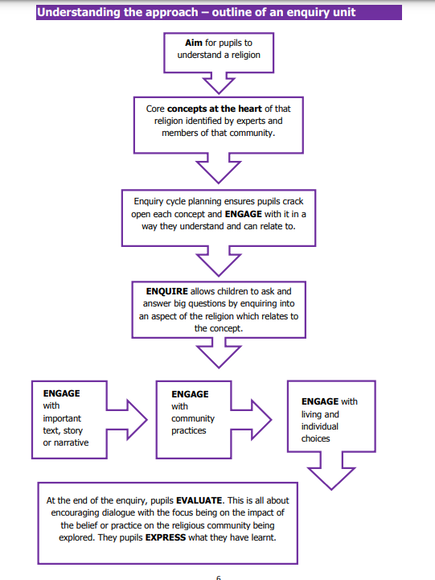
What is our aim with RE at Springfield? (Intent)
Religious education is key for the children at Springfield Junior School in order to understand our world and the people around us. Children are taught about Christianity and the key beliefs and influences in the life of a Christian, as well as other principal religions and world views including Islam, Buddhism, Judaism, Hinduism, Sikhism and Humanism. We also aim to develop positive attitudes to learning about the beliefs and values of others as well as self-awareness, respect, open-mindedness, appreciation and wonder. Whichever religion or world-view the children are learning about, they are encouraged to ‘show acceptance, respect and kindness to others’ and activities used in RE also incorporates learning about and through the British values. This is further supported by our work as a Rights-respecting school as it involves the children understanding their right to their own beliefs and to share their thoughts and be respected and listened to.
What does this look like in our classrooms? (Implementation)
At Springfield, we teach Religious Education through RE days every half term that align with the Suffolk SACRE’s Agreed Syllabus and The Emmanuel Project. Through an enquiry cycle approach, children learn about these different beliefs and teachings, practices and ways of life and how believers express themselves in different ways. The children are taught about key concepts through each unit, they learn to reflect on and consider important questions and ideas, and discuss similarities and differences between different faiths. . At Springfield, pupils are encouraged to share their own religious beliefs and customs to celebrate the school’s cultural diversity. Key dates in religious calendars are referred to in other areas of teaching, such as an RE based talking assembly once a term for each year group and work across the curriculum referencing different religious festivals throughout the year.
Wherever possible, visitors are welcomed into school to share their experiences and stories with the children. Visits to places of worship are organised in line with the RE long term plan to help enhance the children’s learning and to help put their learning into context.
Impact
The children at Springfield Junior School develop an understanding of different religions and world views during their RE experiences in Key Stage Two. Students develop a deepened respect for their peers and others around them who either share their own religion or views or have a different world view. Children enjoy their RE learning and work collaboratively to answer key questions. They can reflect on their own views and experiences and have a better understanding of identity, belonging, meaning, purpose and truth. Children are able to interpret, analyse and explain beliefs, teachings and sources of information. By the time children reach the end of Year 6, they are able to discuss ultimate questions of faith and different ethical questions and different faith responses to these.
Take a look at some examples of exciting RE work from across our school below!

